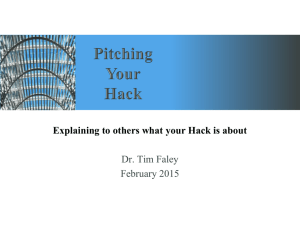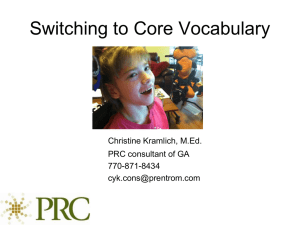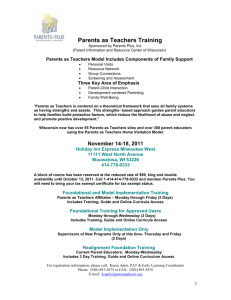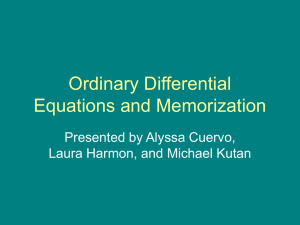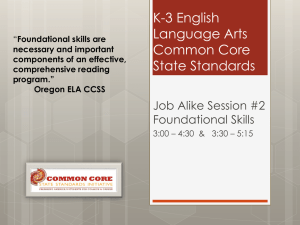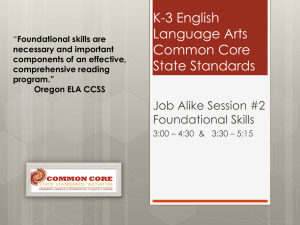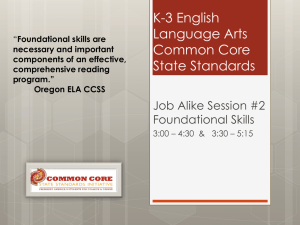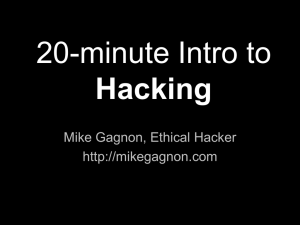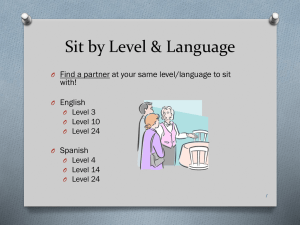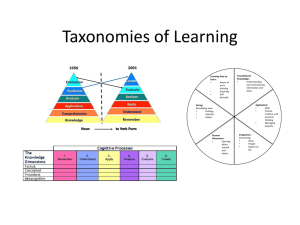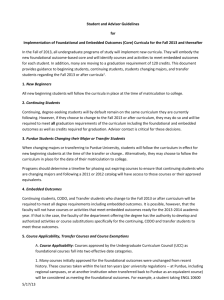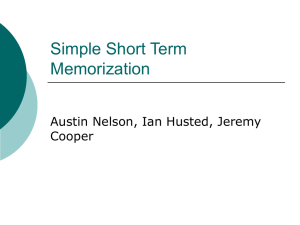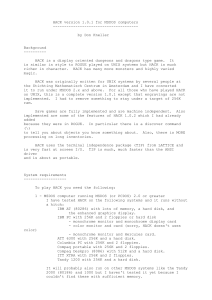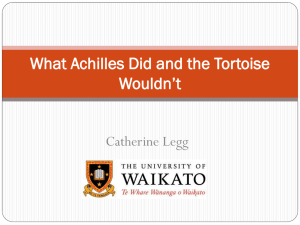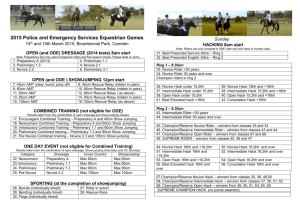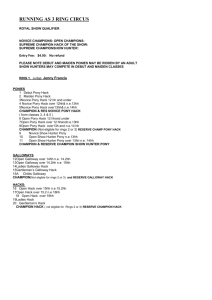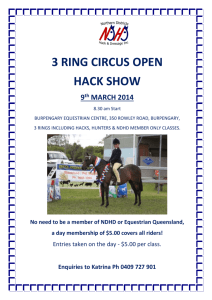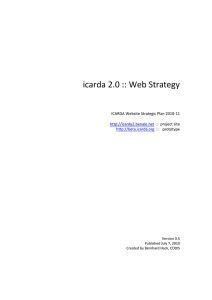Hacking Your Memory - The Skillful Brain
advertisement
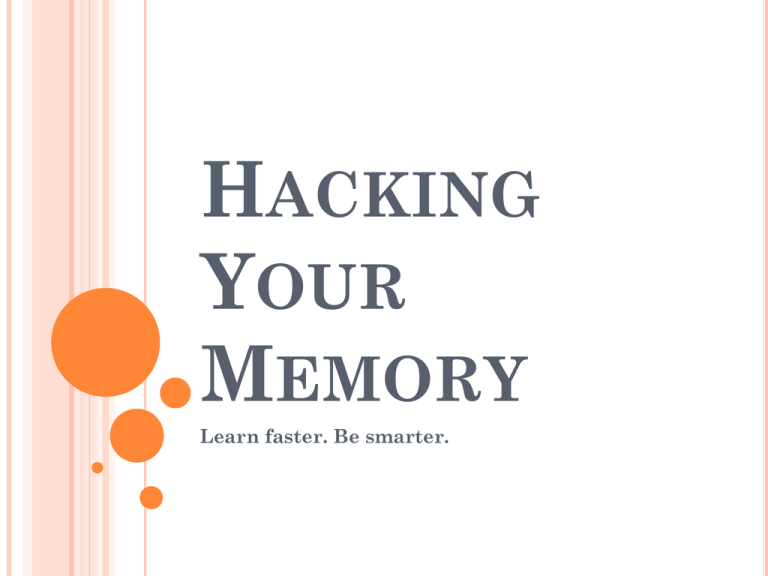
HACKING YOUR MEMORY Learn faster. Be smarter. ABOUT ME Microsoft Developer – C#, F# Former Development Manager Former Enterprise Architect, US Airways Currently writing the next Great Windows 8 Killer App in order to Get Rich Quick. Blog: http://TheSkillfulBrain.com AGENDA Story telling: The Experiment The Case for Memorization Three Key Concepts Foundational Memory Hack: Engaging Your Memory Foundational Memory Hack: Subverting Location Foundational Memory Hack: Beating the Numbers Wrap-up and Review Resources THE EXPERIMENT Initial result: Seven plus or minus two THE EXPERIMENT REVISED 5 minutes. 43 presidents. 100% retention at two weeks. 80% retention at four weeks. 1. George Washington 16. Abraham Lincoln 31. Herbert Hoover 2. John Adams 17. Andrew Johnson 32. Franklin D. Roosevelt 3. Thomas Jefferson 18. Ulysses S. Grant 33. Harry S. Truman 4. James Madison 19. Rutherford B. Hayes 34. Dwight D. Eisenhower 5. James Monroe 20. James A. Garfield 35. John F. Kennedy 6. John Quincy Adams 21. Chester A. Arthur 36. Lyndon B. Johnson 7. Andrew Jackson 22. Grover Cleveland 37. Richard Nixon 8. Martin Van Buren 23. Benjamin Harrison 38. Gerald Ford 9. William Henry Harrison 24. Grover Cleveland (again) 39. Jimmy Carter 10. John Tyler 25. William McKinley 40. Ronald Reagan 11. James K. Polk 26. Theodore Roosevelt 41. George H. W. Bush 12. Zachary Taylor 27. William Howard Taft 42. Bill Clinton 13. Millard Fillmore 28. Woodrow Wilson 43. George W Bush 14. Franklin Pierce 29. Warren G. Harding 44. Barack Obama 15. James Buchanan 30. Calvin Coolidge THE EXPERIMENT REVISED 1. 2. 3. 4. 5. 6. 7. 8. 9. 10. 11. 12. 13. 14. 15. African Lion African Wild Dog (cape hunting dog) Aldabra Tortoise Andean Bear Arabian Oryx Asian Elephant Bald Eagle Bornean Orangutan Capybara Cheetah Chilean Flamingo Coyote Crowned Pigeon Desert Tortoise Fennec Fox 16. 17. 18. 19. 20. 21. 22. 23. 24. 25. 26. 27. 28. 29. Galapagos Tortoise 30. Golden Conure 31. Golden Lion Tamarin 32. Grevy Zebra 33. Hamadryas Baboon 34. Mandrill 35. Meerkat or Suricate 36. Mexican Gray Wolf 37. Mhorr Gazelle 38. Mountain Lion 39. Ocelot 40. Palawan Peacock Pheasant Prairie Dog Radiated Tortoise Reticulated Giraffe Rhinoceros Hornbill Ring-tailed Lemur Rothschild's Mynah Spotted Necked Otter Squirrel Monkey Sumatran Tiger Thick-billed Parrot Warthog White Faced Saki White Rhinoceros THE EXPERIMENT Initial result: Seven plus or minus two Final result: 100+ MODERN ASSUMPTIONS Premise: Memorization is very expensive. Premise: We are very busy. Premise: We have Google and Bing. Conclusion: Memorization isn’t cost effective. Do thinking here Store information here THE LIMITED ACCESS PROBLEM See Pragmatic Thinking And Learning, Andy Hunt THE MENTAL TOOLBOX Thinking Tools Memory Tools Imagination Tools Logic Brainstorming Arithmetic Mind Maps Algebra Meditation Calculus Collaborative Writing Statistics Stream of Consciousness Critical Thinking Free Association Etc… Etc… THOMAS AQUINAS – 1225-1274 A HISTORY OF ACCESSING INFORMATION A HISTORY OF ACCESSING INFORMATION EDUCATION IN THE MIDDLE AGES Trivium Grammar – the mechanics of language Logic – analysis and thinking Rhetoric – communication Invention Arrangement Style Memory Delivery Quadrivium Geometry Arithmetic Astronomy Music THE CASE FOR MEMORY: SUMMARY There is evidence that having more facts in your brain leads to better thinking. There is evidence that Google is not a substitute for knowing stuff. Training in how to use memory was a foundational part of a classical education for hundreds of years. The techniques work, but require considerable effort. Imagine doing math without any kind of training. That’s what you’re currently doing with your memory. Specific memory techniques exist to help you remember faces, numbers, conversations, large sections of text (word for word), large sections of text (Cliff Notes version), lists, sequences, and relations. KEY CONCEPT: MEMORY RULES How the decides if something is worth remembering: 1. Will it keep you from getting eaten by a tiger? 2. Is it new? Is it novel? 3. Is it relevant for understanding social norms? a) b) 4. 5. 6. 7. Is it gossip? Does it illustrate where social boundaries are? Is it emotionally charged? Will it get you food, safety, or prestige? …. Lots and lots of repetition KEY CONCEPT: THE NETWORK The problem is not storing the memory; the problem is accessing the memory. KEY CONCEPT: MEMORY TYPES We suck at remembering Abstract anything Numbers Anything we aren’t emotionally engaged with Anything we perceive as routine We excel at remembering Location Emotions Sights Smells FOUNDATIONAL MEMORY HACK ENGAGING YOUR MEMORY 1. 2. 3. Care. Get emotional. Make memory explicit. FOUNDATIONAL MEMORY HACK SUBVERT LOCATION Many names for the same thing Method of Loci Memory Palace Memory Journey Memory Theatre Demo FOUNDATIONAL MEMORY HACK BEATING THE NUMBERS 01: Captain America 18: Walt Disney 35: Bill Gates 02: Captain Marvel 19: Natalie Portman 36: Natalie Imbruglia 03: Deadpool 20: Billy Crystal 37: Sam Harris 04: Hawkeye 21: Christopher Hitchens 38: Ricky Gervais 05: Hulk 22: Ellen Degeneris 39: Sandra Bullock 06: Iron Man 23: Regina Spektor 40: Adolf Hitler 07: Spider-Man 24: Hugh Laurie 41: Lenin 08: Spider-Woman 25: Omar Epps 42: Stalin 09: Thor 26: Scott Guthrie 43: George Washington 10: Wasp 27: Lucille Ball 44: John Adams 11: Wolverine 28: Pink 45: Thomas Jefferson 12: Doctor Doom 29: Mark Twain 46: Abraham Lincoln 13: Green Goblin 30: Stephen Hawking 47: Teddy Roosevelt 14: Red Skull 31: Albert Einstein 48: FDR 15: Batman 32: Carl Sagan 49: Harry Truman 16: Superman 33: Darren Brown 50: Hymen Rickover 17: Wonder Woman 34: Jennifer Anniston Etc… MEMORIZATION DEFINED The explicit, emotional, creative act of storing information in your brain using a disciplined, structured approach. Memory does NOT “just happen”. Repetition, while often necessary, should be minimized. HOW TO REMEMBER 1. 2. 3. Develop a Memory Toolbox Explicitly decide to remember Use the right memory technique for the data to be memorized THE MENTAL TOOLBOX Thinking Tools Memory Tools Imagination Tools Logic Method of Loci Brainstorming Algebra Peg System Mind Maps Calculus Major System Meditation Statistics Link System Collaborative Writing Critical Thinking PAO System Stream of Consciousness Critical Analysis Dominic System Etc… Etc… Chunking Memory Theatre Etc… SUGGESTED READING Moonwalking with Einstein by Joshua Foer Pragmatic Thinking and Learning by Andy Hunt Mindhacker by Ron and Mary Hale-Evans The Book of Memory by Mary Carruthers Max Your Memory by Pascale Michelon Blog: http://theskillfulbrain.com WHAT IF? What if you memorized a list of design patterns, their uses, strengths, and weaknesses? What if you could easily recall all the WCF hosting options, including their tradeoffs and which environments support which options? What if you could quote the agile manifesto word for word? Or the 12 core principles of agile development? Learning another language? What if the time to learn new vocabulary words was cut by a factor of 5? Or 10? Learning another computer language? What if memorizing a list of ALL of the keywords took only an hour? What if you could actually learn and visualize most of the .NET (or WinRT) namespaces?
